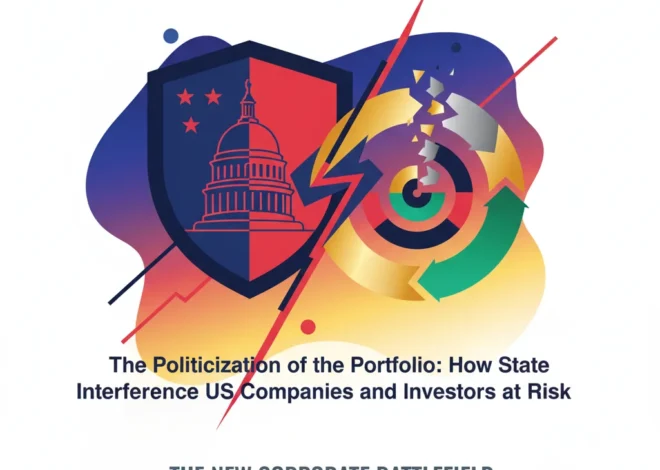
Beyond the Boardroom: Sweden’s Blueprint for Investor Power in the Digital Age
The Quiet Revolution in Corporate Governance
In the complex world of modern finance, the voice of the individual investor can often feel like a whisper in a hurricane. Trillions of dollars move across the global stock market daily, driven by institutional giants and algorithmic trading. Yet, in the heart of Scandinavia, a quiet revolution is taking place, demonstrating that the power of the shareholder is not just alive and well—it’s thriving, thanks to a unique blend of cultural tradition and cutting-edge financial technology. A recent letter in the Financial Times by Hanna Vainio, CEO of Euroclear Sweden and Finland, highlights this remarkable trend, revealing how Swedish shareholder democracy is setting a new global standard.
This isn’t just a story about corporate meetings; it’s a blueprint for the future of investing. It explores how technology can bridge the gap between corporations and their true owners, fostering a more transparent, accountable, and ultimately more resilient economy. As markets grapple with volatility and investors demand greater influence, the Swedish model offers invaluable lessons on empowering every shareholder, one digital vote at a time.
The Swedish Anomaly: A Culture of Ownership
To understand Sweden’s success, one must first appreciate its deep-rooted culture of public ownership. Unlike many Western economies where stock market participation is dominated by large institutions, Sweden has a long history of encouraging widespread, direct share ownership among its citizens. This concept, often tied to the idea of “folkaktier” (people’s shares), was popularized during the privatization of major state-owned companies, creating a society where owning a piece of the nation’s top corporations is a common aspiration.
This cultural foundation creates a powerful feedback loop. When a significant portion of the population is directly invested in the stock market, there is a greater collective interest in corporate conduct, long-term strategy, and ethical governance. This contrasts sharply with markets where retail investors are often passive participants, their influence diluted within massive pension funds or ETFs. In Sweden, ownership is personal, and with it comes a sense of responsibility and a desire for active participation.
The results speak for themselves. The level of engagement in Annual General Meetings (AGMs)—the primary forum where shareholders can exercise their voting rights—is exceptionally high. According to insights shared by Euroclear, participation in the AGMs of Nasdaq Stockholm-listed companies is consistently robust, a testament to this engaged investor base. This active involvement ensures that corporate boards are held accountable not just by a handful of fund managers, but by a broad cross-section of society.
Hargreaves Lansdown Enters a New Chapter: A Founder's Legacy and the Future of Fintech
The Pandemic Pivot: How Technology Solidified Shareholder Democracy
While Sweden’s culture of ownership provided the fertile ground, it was the rapid advancement of fintech that allowed its shareholder democracy to truly blossom, especially in the face of a global crisis. The COVID-19 pandemic forced a worldwide rethink of the traditional, in-person AGM. For many, this was a logistical nightmare. For Sweden, it was an opportunity to accelerate a digital transformation that was already underway.
As Hanna Vainio points out, the shift to digital and hybrid AGMs was not a stopgap measure but a catalyst for even greater inclusion. By removing the geographical and physical barriers to entry, companies enabled more shareholders than ever to participate. An investor in a remote part of Sweden could now engage with the board of a Stockholm-based multinational with the same ease as someone in the capital.
This digital pivot has led to impressive and sustained engagement. Let’s look at the participation trends for major Swedish-listed companies before and after the widespread adoption of digital AGM solutions.
The table below illustrates the evolution of shareholder participation in AGMs for companies on the Nasdaq Stockholm Large Cap index, reflecting the impact of digital solutions.
| Year | Average AGM Participation (% of Total Share Capital) | Primary Meeting Format |
|---|---|---|
| 2019 (Pre-Pandemic) | 75% (source) | Predominantly In-Person |
| 2021 (Peak-Pandemic) | 80% (source) | Primarily Digital/Proxy |
| 2023 (Post-Pandemic) | 81% (source) | Hybrid (In-Person & Digital) |
The data clearly shows that not only was participation maintained during the pandemic’s disruption, but it actually increased and stabilized at a higher level. This proves that financial technology is not just a convenience; it’s a powerful tool for democratizing finance and strengthening the core tenets of corporate governance.
The Future is Fintech: Blockchain, AI, and the Next Wave of Investor Empowerment
The move to digital AGMs is just the beginning. The ongoing revolution in financial technology promises to further dismantle the barriers between investors and the companies they own. The future of shareholder engagement lies at the intersection of accessibility, data, and security—areas where fintech is making its most significant strides.
Here are some of the key innovations poised to reshape the landscape:
- Blockchain and Distributed Ledger Technology (DLT): The potential for blockchain in corporate governance is immense. By recording votes on an immutable ledger, DLT can bring unprecedented transparency and security to the proxy voting process. It eliminates discrepancies, ensures every vote is counted accurately, and provides a verifiable audit trail. This technology could end the persistent issues of “over-voting” and “empty voting” that plague traditional systems, solidifying the integrity of the entire stock market infrastructure.
- AI-Powered Investor Tools: For many retail investors, the sheer volume of information in annual reports and proxy statements is overwhelming. Artificial intelligence can level the playing field by analyzing complex documents and providing concise, understandable summaries of key proposals and their potential impact. This empowers investors to make informed decisions without needing a degree in finance or economics.
- Integrated Digital Platforms: The future of banking and investing is a seamless, integrated experience. Imagine a platform where you can not only execute a trade but also access research, cast your proxy vote, and participate in an AGM livestream directly from your mobile banking app. This holistic approach to financial services will make shareholder participation a natural and effortless part of the investing journey.
These advancements in financial technology are not just theoretical; they are actively being developed and deployed, promising to create a more dynamic and responsive relationship between corporations and their shareholders.
UBS's Private Credit Headache, Wall Street's Crypto Gamble, and a Saudi Reality Check
Global Lessons: A Comparative Look at Shareholder Rights
Sweden’s success provides a powerful benchmark for other nations. While every market has its unique regulatory and cultural context, the core principles of transparency and accessibility are universal. Examining how different major economies approach shareholder participation highlights the potential for improvement worldwide.
The following table offers a simplified comparison of shareholder models in several key markets.
| Country | Dominant Investor Type | Retail Shareholder Power | Adoption of Digital Voting |
|---|---|---|---|
| Sweden | Balanced (High Retail & Institutional) | High & Culturally Ingrained | Very High & Standardized |
| United States | Institutional | Low (Fragmented, complex proxy system) | Moderate (Growing but not universal) |
| United Kingdom | Institutional | Moderate (Strong governance codes) | High (Accelerated post-pandemic) |
| Japan | Corporate (Cross-holdings) & Institutional | Low but Growing | Moderate (Cultural barriers to virtual meetings) |
This comparison reveals that while technology is a global trend, its impact is mediated by local conditions. For countries looking to boost investor engagement, the path forward involves a two-pronged approach: first, implementing the necessary fintech infrastructure to make participation easy, and second, fostering a regulatory and corporate environment that actively encourages it. This includes simplifying the proxy voting chain, protecting shareholder rights, and promoting clear communication from corporate boards.
The £20 Billion Warning: Why Financial Giants Are Urging the UK to Rethink Its Finances
Conclusion: The Dawn of a New Shareholder Era
The story of Sweden’s thriving shareholder democracy is more than just a local success story; it’s a powerful signal for the entire global finance ecosystem. It proves that when a culture of ownership is combined with forward-thinking financial technology, the result is a more engaged, accountable, and robust stock market. The insights from Hanna Vainio and Euroclear Sweden are not merely observations but a call to action.
For investors, the message is to recognize the power you hold and embrace the digital tools that give you a voice. For corporations, it is to see shareholder engagement not as a compliance burden but as a strategic asset for building long-term value and trust. And for the broader banking and fintech industries, it is to continue innovating, building the platforms that will power a truly democratic and accessible global economy. The future of investing isn’t just about trading stocks; it’s about shaping the companies that drive our world.


